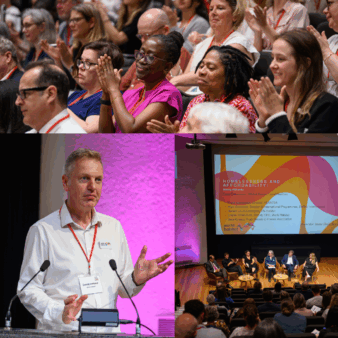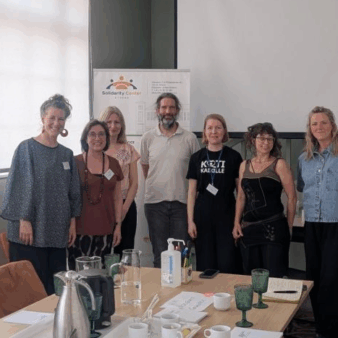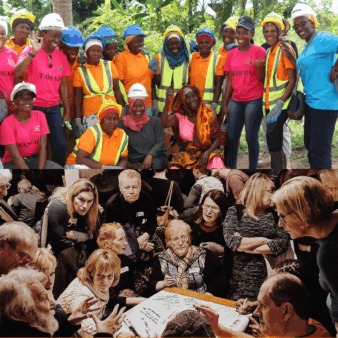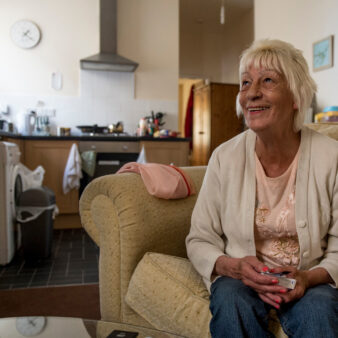Founder of the Building and Social Housing Foundation
For over 50 years Peter Elderfield was known, both nationally and internationally, as a pioneer of innovation in social housing. A desire to challenge conventional thinking and to develop new and better ways of providing housing were the hallmarks of his lifetime’s work.
Born, bred and nurtured on the Yorkshire Moors, Peter Elderfield was trained as a land agent on the estates of the Marquis of Zetland. His wartime experiences as a young man, together with his admiration of the writings of Percy Shelley and George Bernard Shaw, seared in him a passion for challenging the accepted order.
In 1946, at the age of 25, Peter Elderfield established the East Midlands Housing Association – the first post war housing association specifically intended to provide homes for ex-servicemen and coalminers. Recently demobbed and leading a group of homeless and penniless ex-servicemen he decided to set up his own housing organisation, rather than wait to be housed by the hard-pressed local authorities. He obtained the initial financial support from the co-operative movement. Perseverance, good luck and determination on his part enabled the fledgling organisation to obtain priority for labour and materials from Aneurin Bevan, the Minister responsible for housing at that time.
The Association’s early successes, against all odds, and the value of what it was doing, brought the respect and admiration of other agencies in the housing field. With a loyal and hard working group of employees, EMHA went on to expand its activities into house-building for sale and contract repair work as well as the provision of social housing. It eventually became an integrated building, housing and planning organisation operating throughout the East Midlands. In 1971, the Association was placed second in a national survey of building firm performance. Always prepared to innovate, the East Midlands Housing Association was one of the associations chosen by the government to pioneer new government housing initiatives. Peter Elderfield remained President of the Association, now one of the largest in the Midlands, until his death.
He was also involved in local politics and was one of the youngest councillors ever elected to Leicestershire County Council. An active and popular councillor, he eventually found the rigidity of constantly adhering to strict party lines too restrictive.
Peter Elderfield’s prominence in the housing world led him to be involved with the establishment of the Housing Corporation. He was also a founder member of the European Liaison Committee for Social Housing as well as the Housing Committee of the International Co-operative Alliance. The subsequent expansion of these organisations into large bureaucracies was a constant source of regret, a poignant reminder for him of the Hegelian dialectic that everything turns into its opposite.
In 1976, Peter Elderfield established the Building and Social Housing Foundation, a registered charity endowed with non-state aided assets from the housing association’s building for sale activities. With a remit to carry out research into residential housing, it set out to continue the pioneering spirit of the original founders of EMHA. In 1985 the Building and Social Housing Foundation pioneered the search for innovative housing practice around the world with the World Habitat Awards, an international competition to identify innovative housing solutions that are making a very real difference to the lives of the poor. Throughout his life he looked for solutions and was impatient of those who sought only to identify problems. The World Habitat Awards have helped to identify and make better known many innovative housing solutions around the world and continue to do so. The United Nations Centre for Human Settlements has always been very supportive of the work of the Building and Social Housing Foundation and in 1997 presented Peter with the Habitat Scroll of Honour in recognition of his work.
In 1981, he was seriously injured while working in Tanzania. The mission hospital where he lay for three days, critically injured, had only two qualified staff, no telephone, no electricity and no running water. Overhead, the latest military warplanes screamed across the skies. For the rest of his life he actively campaigned for the reallocation of resources away from military expenditure to meet humanitarian needs, and for a time was an adviser to the Centre for International Peacebuilding. To mark the International Year of Shelter for the Homeless in 1987 he drew together many international statesmen to produce a handbook of readings on Homelessness and the Misallocation of Global Resources.
Forever impatient of bureaucracy and officialdom, he fought against the creation of welfare dependency. The well-paid welfare bureaucrats and development consultants who made a comfortable living at the expense of those in poverty were particular bêtes noirs. Whenever visiting housing programmes around the world, he infinitely preferred to spend time with local people in their homes than with officials and dignitaries. He was blessed with that rare ability to talk happily to anyone he met and to make friends wherever he went.
Impatient, unpredictable and difficult – sometimes, but also generous and kind and driven by a desire to bring about a better world – a world which did not waste billions of dollars every year on military expenditure while human beings lived in degradation and poverty.
Even when illness dogged the later years of his life, he continued to direct the work of the Foundation and to fight for those beliefs he held dear. On his death certificate his occupation was recorded as “Revolutionary” …. he would have liked that.




